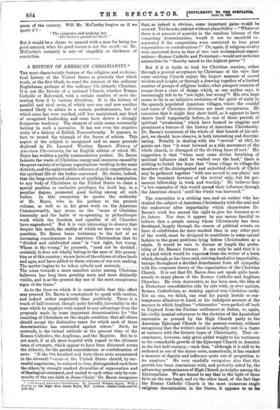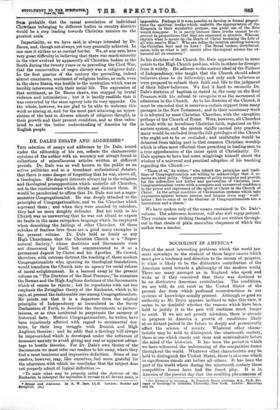A HISTORY OF AMERICAN CHRISTIANITY.* THE most characteristic feature of
the religious and ecclesias- tical history of the United States is precisely that which tends, at the first blush, to repel the interest of the ordinary Englishman, perhaps of the ordinary Cis-Atlantic Christian. It is not the history of a national Church, whether Roman Catholic or Reformed, with a certain number of sects dis- senting from it in various directions. It is the history of parallel and rival sects, of which now one and now another seemed likely to attain to a certain predominance, but of which none has ever reached, still less maintained, any kind of recognised leadership, and some have shown a strongly fissiparous tendency. The element of unity seems necessarily lacking in such a narrative. It has not even the negative unity of a history of British Nonconformity. It appears, in fact, to record the triumph of the forces of schism. This aspect of the subject is recognised and on many grounds deplored in Dr. Leonard Woolsey Bacon's History of American Christianity, for an English edition of which Mr. Bryce has written a justly commendatory preface. Dr. Bacon laments the waste of Christian energy and resources caused by the great variety of religious organisations working in the same districts, and the unfavourable influence of such competition on the spiritual life of the bodies concerned. He claims, indeed, that the long-continued absence of anything like a temptation to any body of Christians in the United States to claim a special position or exclusive privileges for itself has, in a peculiar degree, promoted good feeling among all such bodies. In this connection he quotes the authority of Mr. Bryce, who in his preface to the present volume, as well as in his great work on the American Commonwealth, lays stress on the "sense of Christian fraternity and the habit of co-operating in philanthropic work which the freedom and equality of all Churches have engendered." But it is very interesting to observe that despite this merit, the reality of which we have no wish to question, Dr. Bacon bears testimony to the fact of an increasing consciousness in American Christendom that its "divided and subdivided state" is "not right, but wrong. Whose is the wrong," he proceeds, "need not be decided ; certainly it does not wholly belong to the men of this genera- tion or of this country; we are heirs of theschisms of other lands and ages, and have added to them schisms of our own making The matter begins to be taken soberly and seriously The nssus towards a more manifest union among Christian believers has long been growing more and more distinctly visible, and is at the present day one of the most conspicuous signs of the times."
As to the lines on which it is conceivable that this effort may proceed Dr. Bacon is constrained to speak with caution, and indeed rather negatively than positively. There is a touch of half-ironical, though quite friendly, incredulity in the tone which he employs with regard to any advantage from the proposals made by some important denominations for " the reuniting of Christians on the simple condition that all-others should accept the distinctive tenet for which each of these denominations has contended against others." Such, he contends, is the virtual attitude at the present time of the Roman Catholics, the Anglicans, and the Baptists. But he is not mach, if at all, more hopeful with regard to the ultimate issue of attempts, which appear to have been discussed across the Atlantic, for the partial consolidation or confederation of sects. "If the one hundred and forty-three sects enumerated in the eleventh Census of the United States should, by suc- cessful negotiation, be reduced to four, distinguished each from the others by strongly marked diversities of organisation and of theological statement, and united to each other only by com- munity of the one faith in Jesus Christ," Dr. Bacon recognises • .4 Ilistory of Amtrt can Christianity. By Leonard Woolsey Bacon. With a PlOs. ed.)reface by the Blight Hon. James Bryce, M.P. London : James Clarke and Co. E that, as indeed is obvious, some important gains would be secured. Yet he asks, and not without plausibility :---" Whatever there is at present of asperity in the emulous labours of the competing denominations, would it not be manifold ex- asperated if the competition were restricted to four great corporations or confederations I" Or, again, if religious rivalry were narrowed down to that of two vast :ecclesiastical organi- sations—Roman Catholic and Protestant—would not sectarian animosities be " thereby raised to the highest power " ?
But if it is futile to look for 'Christian reunion,' either through a general acceptance by Christians of the view, that some existing Church enjoys the largest measure of sacred wisdom and insight, or through a drawing together of a limited number of groups of religious bodies, what prospect remains of escape from a state of things which, as our author says, is increasingly felt to be "not right, but wrong"? His own hope seems to lie in an initiative evolution of the spirit of unity in, the sparsely populated American villages, where the scandal, and waste of Christian divisions are most conspicuous. He conceives that it might first show itself, as it appears to have. shown itself temporarily before, in one of those periods of spiritual "awakening" which have formed "so singular and prominent a feature of the history of American Christianity. Dr. Bacon's treatment of the whole of that branch of his sub- ject, we should here observe, is both interesting and discrimi- nating. Notably in dealing with the " revival " of 1857, he points out that "it went forward as a tide movement of the whole church, in disregard of the dividing lines of sect." His suggestion is that "when next some divine breathing of spiritual influence shall be wafted over the land," there is nothing to forbid the hope that "from village to village the members of the disintegrated and enfeebled church of Christ may be gathered together ' with one accord in one place,' not for the transient fervours of the revival only, but for pei- manent fellowship in work and worship." He believes that "a few examples of this would spread their influence through the American church ' until the whole was leavened."
The conception is a striking one, and an author who has studied the subject of American Christianity with the zeal and the endeavour after impartiality which characterise Dr. Bacon's work has earned the right to give his forecast as to its future. Nor does it appear by any means fanciful to believe that a people among whom Christianity has been developed, largely through the course of political events, on lines of subdivision far more marked than in any other part of the world, must be designed to contribute in some special fashion to the great problems lying before Christendom as a whole. It would be vain to discuss at length the proba- bility of Dr. Bacon's forecast. It can only be said that it is of a kind which would be expected from the writer of a book which, though, as has been said, striving hard after impartiality, betrays throughout a decided detachment from all sympathy with the corporate theory of the organisation of the Christian Church. It is not that Dr. Bacon does not speak quite hand- somely in many places of the Roman Catholic and Anglican Churches. He even deprecates, as has been seen, the idea of a Protestant consolidation side by side with, or over against, Roman Catholicism, as making against true Christian unity. Yet no one, we think, can read his purely hostile or con- temptuous allusions to Laud, or his indulgent account of the manner in which Anglican " schismatics " were packed off back to England from the Puritan settlement at Salem, or, again, his civilly ironical references to the doctrine of the Apostolical succession as pressed by the High Church party in the American Episcopal Church in the present century, without recognising that the writer's mind is naturally cast in a frame at variance with the historic types of Christianity. That cir- cumstance, however, only gives added weight to his testimony to the remarkable growth of the Episcopal Church in America in the last half-century,—such that, "although it is still to be reckoned as one of the minor sects, numerically, it has reached a measure of dignity and influence quite out of proportion to its numbers." He very candidly recognises also that this growth has been concurrent with, and probably aided by, the advancing predominance of High Church principles among the Episcopalians. We are bound to say that in the light of these facts on the one hand, and on the other hand, of the fact that the Roman Catholic Church is the most. numerous single religious denomination in the States, it appears to us far fro= . probable that the casual association of individual Chrbstians belonging to different bodies in country districts would be, a step leading towards Christian reunion on the greatest scale.
Impartiality, as we have said, is always intended by Dr. Bacon, and, though not always, yet very generally achieved. In one case it strikes us as carried too far. We, at any rate, have very great difficulty in believing that there was much sincerity in the view evolved by apparently all Christian bodies in the South during the twenty years or so preceding the Civil War, that the conservation of negro slavery was a religious duty. In the first quarter of the century the prevailing, indeed almost unanimous, sentiment of religious bodies, as such, even in the slave States, was hostile to the institution which was so terribly interwoven with their social life. The expression of that sentiment, as Dr. Bacon shows, was stopped by brutal violence and intimidation ; but it is hardly credible that it was converted by the same agency into its very opposite. On the whole, however, we are glad to be able to welcome this work as aiming at, and for the most part attaining, an appre- ciation of the best in diverse schools of religious thought, in their growth and their present condition, and as thus calcu- lated to aid the better understanding of America by the English people.



















































 Previous page
Previous page